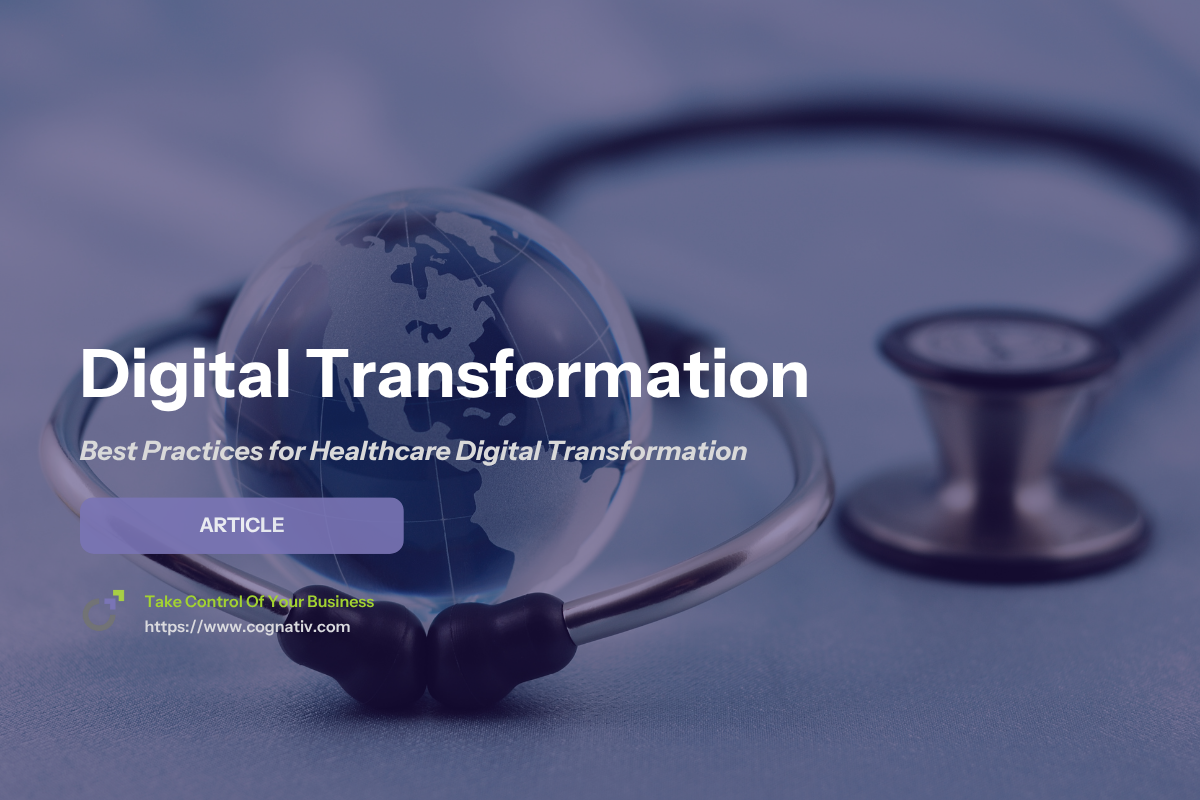Best Practices for Healthcare Digital Transformation
The transformation of healthcare is fundamentally changing how patients receive care and how providers deliver it. Powered by technologies like electronic health records and artificial intelligence, this transformation aims to enhance patient outcomes and operational efficiency. In this article, we will delve into the key technologies driving these changes and their impact on healthcare.
Key Takeaways
-
Healthcare transformation focuses on a patient-centric approach, integrating technology and fostering collaboration to improve health outcomes and satisfaction.
-
Key technological innovations such as EHR, AI, and telemedicine are essential for enhancing operational efficiency and delivering personalized care to patients.
-
Challenges in digital transformation include resistance to change, data security concerns, and financial pressures; overcoming these requires effective leadership and strategic resource allocation.
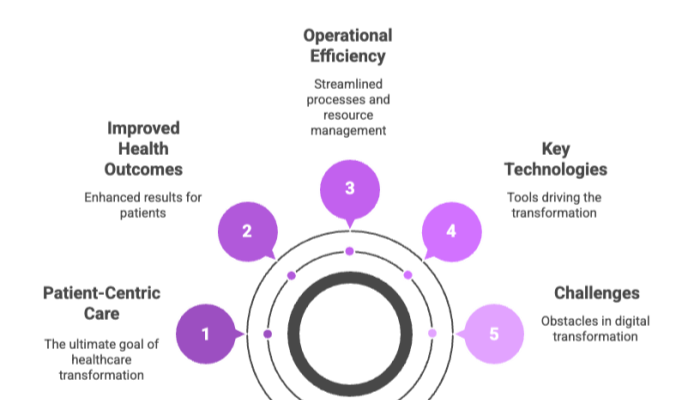

The Essence of Healthcare Transformation
Healthcare transformation is fundamentally about placing the patient at the center of care. This patient-centric approach prioritizes the needs and preferences of individuals, ensuring that healthcare services are tailored to improve health outcomes and patient satisfaction. Aligning a strategic vision with organizational goals is key to effective transformation, addressing technological challenges and fostering a culture of innovation.
Enhancing the accessibility and affordability of health services through digital solutions and technology solutions is a major focus of health care transformation. Integrating advanced technologies allows healthcare organizations to modernize systems and streamline operations for more efficient and effective care delivery, promoting health equity. Collaboration among healthcare stakeholders is also crucial, driving innovation and the adoption of new ideas.
Fostering a culture of innovation through experimentation enables the testing and implementation of new ideas and technologies within healthcare organizations. Successful healthcare transformation initiatives often result in improved patient satisfaction and better health outcomes, demonstrating the value of a strategic and patient-centered approach.
Ultimately, healthcare transformation revolves around revolutionizing health care delivery through a strategic, patient-centric approach, bolstered by collaboration and technological innovation. This health care transformation not only improves patient outcomes but also enhances the overall quality and efficiency of healthcare services.
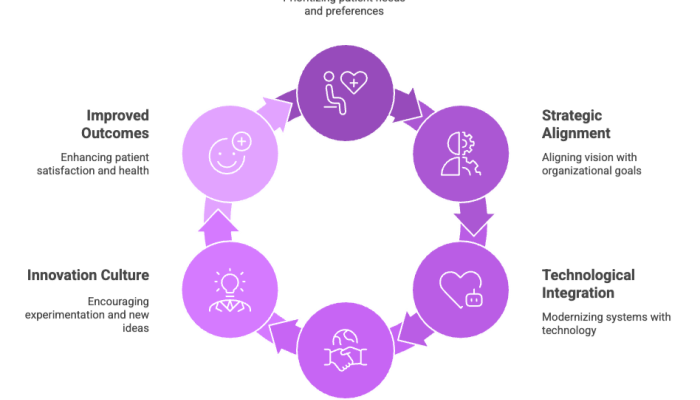

Technological Innovations in Healthcare
Technological innovations are at the heart of healthcare transformation, driving significant improvements in patient care and operational efficiency. Digital technologies such as:
-
Electronic health records (EHR)
-
Artificial intelligence (AI)
-
Wearable technology
-
The Internet of Things are revolutionizing the healthcare landscape. These advancements offer a broader range of choices for patient care, fostering a culture that centers around the patient’s needs.
Healthcare organizations benefit immensely from digital transformation through improved data collection and analysis, leading to proactive care management and better patient outcomes. Examples of digital medical technologies include:
-
Teleradiology
-
Telediagnosis
-
EHR systems
-
Computer-Aided Diagnosis All of these contribute to more accurate and efficient care delivery.
As we explore the specific technological innovations in healthcare, we will look at the role of electronic health records and artificial intelligence. These technologies are pivotal in transforming healthcare systems, improving data availability, diagnostic accuracy, and patient care.
Electronic Health Records (EHR) Systems
Electronic Health Records (EHR) systems are a cornerstone of modern healthcare, enabling providers to manage patient information digitally and efficiently. By implementing electronic health records and maintaining accurate medical records, healthcare organizations can enhance data availability, streamline workflows, and improve patient care through electronic health record systems.
One significant benefit of EHR systems is their ability to facilitate personalized treatment plans. EHR systems enable healthcare providers to create tailored treatments based on patient-specific data, contributing to more effective and individualized care. This personalization is crucial for improving patient outcomes and satisfaction.
Transcription technology further enhances EHR systems by enabling doctors to document patient interactions easily. By speaking into a microphone, healthcare professionals can improve workflow and data entry, ensuring that patient information is accurately and efficiently recorded.
Overall, the implementation of EHR systems represents a significant step forward in the transformation of the health care system. These systems not only improve data management and accessibility but also support personalized care and efficient workflows, ultimately enhancing the quality of patient care.
Artificial Intelligence in Healthcare
Artificial Intelligence (AI) is revolutionizing healthcare by improving diagnostic processes and optimizing treatment protocols. The integration of AI and machine learning into healthcare systems is expected to significantly enhance diagnostic accuracy and patient care. These technologies analyze vast amounts of data, identifying patterns and providing insights that human clinicians might miss.
AI applications in healthcare focus on various areas, including image analysis, predictive analytics, and personalized medicine. Leveraging AI enables healthcare providers to develop more precise diagnostic tools and treatment plans, improving patient health outcomes.
The potential of AI in healthcare is vast, and its integration into clinical practice is just beginning. As these technologies continue to evolve, they will play an increasingly important role in transforming healthcare, making it more efficient, accurate, and patient-centered.
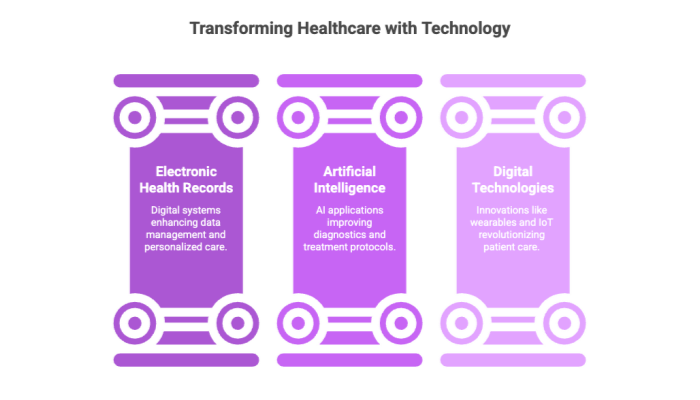

Challenges in Digital Transformation Efforts
Despite the numerous benefits of digital transformation, healthcare organizations face significant challenges in implementing these changes. Resistance to change is a common obstacle, often stemming from fears about disrupting workflows and a conservative organizational culture. Overcoming this resistance requires effective leadership to promote buy-in and communicate the rationale for digital transformation.
Data security and privacy concerns are also prevalent among healthcare professionals during digital transformation. Ensuring the protection of sensitive patient information is paramount, and robust cybersecurity measures are essential to prevent data breaches and unauthorized access. Financial pressures, such as rising operational costs and declining reimbursements, further complicate the digital transformation process.
Prioritizing resources, funding, and strategic investments through strong leadership facilitates successful digital transformation initiatives. Organizational culture plays a significant role in the success of these efforts, with many healthcare providers identifying it as a barrier to transformation. Adequate infrastructure and training are essential to create opportunities for digital transformation and ensure its success.
Regulatory Compliance and Data Security
Regulatory compliance and data security are critical components of digital transformation in healthcare. The protection of sensitive patient information from breaches and attacks is a top priority for healthcare organizations. Enhanced cybersecurity measures, such as multi-factor authentication and encryption, are essential for securing healthcare data.
Adhering to regulations like HIPAA is crucial for safeguarding personal health information in the evolving digital landscape. Integrating robust access controls and conducting regular security assessments help maintain data protection in digital platforms.
The digital transformation process introduces potential health risks such as data breaches and unauthorized access, making comprehensive security measures indispensable. By prioritizing cybersecurity and adhering to regulatory standards, healthcare organizations can ensure the protection of patient information while leveraging digital technologies for improved care delivery.
Financial Pressures and Resource Allocation
Financial pressures are a significant challenge in the digital transformation of healthcare. Rising operational costs and declining reimbursements make it difficult for healthcare organizations to allocate resources effectively. However, digital transformation can improve operational efficiency by streamlining administrative processes and optimizing workflows.
Effective resource allocation is crucial for reducing wait times, minimizing bottlenecks, and improving patient satisfaction. A transformation strategy provides visibility into resource utilization and demand patterns, aiding in better management and planning. Improved patient engagement and expanded service offerings create opportunities for revenue generation through digital initiatives.
Value-based care, which focuses on quality care, provider performance, and patient experience, is an essential aspect of optimizing resource allocation. Healthcare systems have the ability to create action plans for digital transformation initiatives to improve healthcare quality. Additionally, they can establish key performance indicators (KPIs) to monitor progress and evaluate success.
Partnerships with specialized providers and the emergence of community health clinics offer solutions for delivering timely and efficient care to patients. Addressing financial challenges and optimizing resource allocation enable healthcare organizations to successfully navigate the digital transformation journey.
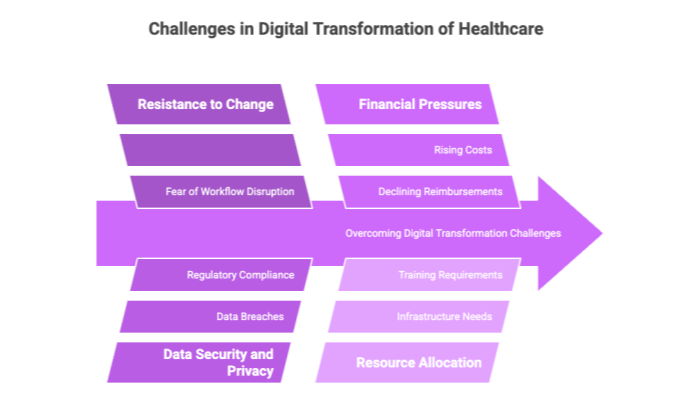

Enhancing Patient Care Through Technology
Technology plays a pivotal role in enhancing patient care, offering tailored digital strategies that improve patient outcomes. Digital transformation in healthcare empowers patients by providing them with access to and control over their health information through various applications, facilitating better decision-making with digital technology.
Healthcare organizations like Atrium Health have integrated virtual health services, significantly enhancing accessibility to care for patients. The use of predictive analytics and AI in telemedicine improves patient engagement and assists in diagnostic processes, leading to better health outcomes.
Exploring specific applications of technology in patient care reveals the impact of telemedicine and patient-centered care models. These innovations are transforming how healthcare is delivered, making it more efficient, accessible, and tailored to individual patient needs.
Telemedicine and Remote Care
Telemedicine is transforming how healthcare services are delivered, improving access for patients, especially in underserved areas. Digital transformation in healthcare, particularly through telemedicine, addresses disparities in accessibility, allowing historically underserved populations to receive timely and effective care.
Telemedicine helps overcome geographic distance and transportation challenges, making it easier for patients to access healthcare services. The telemedicine market is projected to grow significantly, driven by technological advancements and the increasing demand for accessible healthcare.
Virtual urgent care departments are being established, providing patients with face-to-face medical visits around the clock, broadening timely access to health care facilities. E-health usage is rapidly increasing among patients with chronic diseases, helping them manage their health effectively from home.
Overall, telemedicine is one of the most important innovations in health services, offering essential care in a more accessible format and improving patient outcomes.
Patient-Centered Care Models
Patient-centered care models are essential for improving patient outcomes and satisfaction. Digital transformation enhances accessibility, communication, and health management for patients, aligning healthcare services with their unique needs and preferences.
Patients today expect convenient access, personalized experiences, and seamless communication from healthcare services. The adoption of digital tools in healthcare enhances patient engagement, allowing patients to be more involved in their care and self-management.
Implementing interoperability standards promotes care coordination and reduces duplication. Additionally, it improves the accuracy of patient records. Involving patients in monitoring their symptoms leads to improved awareness and better management of their chronic conditions.
The goal of tailoring care through patient-centered design is to predict health risks and tailor appropriate interventions, ultimately improving the quality of care and patient satisfaction.
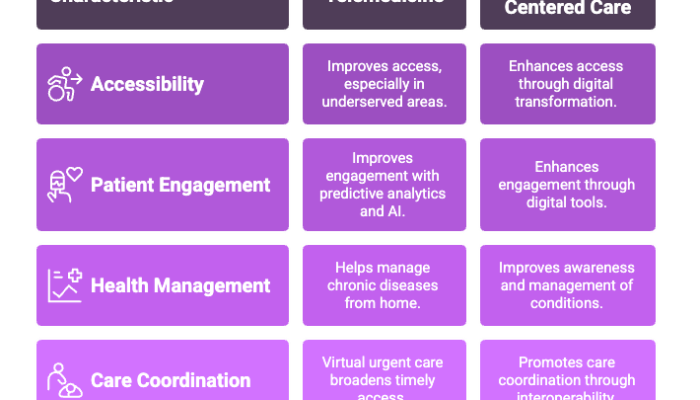

Workforce Management in a Digital Era
Digital transformation demands effective workforce management to integrate technology into healthcare practices seamlessly. Health care leaders must lead the charge in this integration, ensuring that healthcare professionals are equipped with the necessary skills and knowledge. Change management is critical to the success of implementing digital transformation, requiring collaboration among clinicians, administrators, and patients.
By fostering a digital culture and promoting continuous improvement, healthcare organizations can enhance operational efficiency and improve patient care. This section will explore the importance of training healthcare professionals and improving staff efficiency and engagement in the context of digital transformation.
Training Healthcare Professionals
Continuous professional development is essential for healthcare workers to keep pace with evolving digital health technologies. Competency frameworks are being developed to guide the necessary skill sets healthcare professionals need in a digital environment. AI and cybersecurity skills are becoming increasingly important for healthcare professionals, addressing a significant skills gap.
Comprehensive training programs equip healthcare professionals in the healthcare industry. They enhance their knowledge and skills to effectively incorporate digital tools into their workflows. Ongoing support and mentorship should be offered to employees in healthcare technology, ensuring they are confident and proficient in using new systems.
Prioritizing training and upskilling is essential to address skill gaps in the healthcare workforce. Engaging users early in the digital transformation process increases acceptance and adoption rates of digital technologies, building awareness through consultations, demonstrations, and feedback sessions.
Improving Staff Efficiency and Engagement
Digital transformation offers numerous opportunities for healthcare employees, including professional growth, skill development, and career advancement. Celebrating successes during transformation initiatives recognizes contributions and instills momentum for future initiatives. Success stories can inspire employees to embrace innovation. Additionally, testimonials can motivate them to welcome change.
Transformation enables employees to enhance their efficiency and collaborate better. This leads to the delivery of higher-quality patient care. Automated scheduling systems enhance operational efficiency by optimizing staff shifts according to patient demand, ensuring that resources are used effectively and patients receive timely care.
Recognizing and rewarding employee contributions during transformation initiatives fosters a culture of engagement and collaboration, encouraging continuous improvement and innovation within the organization.
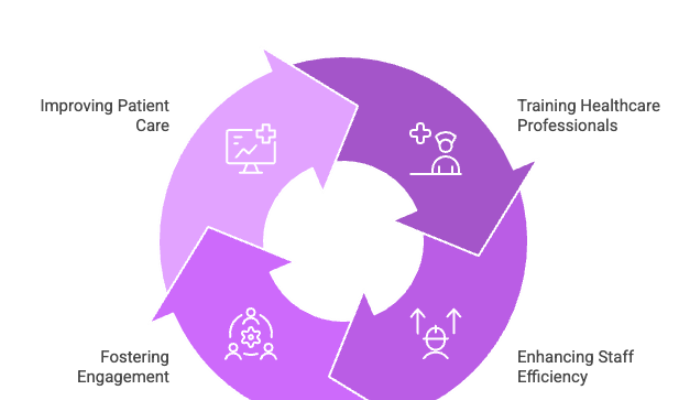

Operational Efficiency and Decision-Making
Operational efficiency and informed decision-making are crucial for the success of healthcare transformation. Digital tools enhance operational processes and improve patient care, allowing healthcare organizations to allocate resources more effectively. By revolutionizing resource allocation, workflow management, and patient care delivery, digital transformation optimizes decision-making in healthcare settings.
AI-based automation for administrative tasks significantly enhances productivity and clinician efficiency, freeing up time for healthcare professionals to focus on patient care. Digital technologies lead to better efficiency, productivity, and high-quality care in healthcare organizations.
Data-Driven Decision-Making
Healthcare transformation enhances clinical decision-making by:
-
Using technology to collect, analyze, and interpret health data.
-
Gathering vast amounts of data from patient records, medical devices, and administrative systems.
-
Providing valuable insights for better clinical processes.
Data management solutions in healthcare help ensure compliance with regulatory standards. This includes standards related to quality reporting and patient safety. Establishing clear action plans and metrics allows organizations to monitor effectiveness, identify areas for improvement, and make data-driven decisions, ultimately enhancing patient care and operational efficiency.
Enhancing Communication and Collaboration
Digital tools in healthcare enhance collaboration among providers, leading to improved patient outcomes. Digital platforms facilitate collaboration and knowledge sharing among healthcare professionals, ensuring that patients receive coordinated and comprehensive care.
Cybersecurity and digital transformation teams work hand in hand to ensure greater transparency and ownership, fostering a culture of collaboration and continuous improvement. Data analytics informs process improvements and drives organizational performance, making communication and collaboration more effective and efficient.
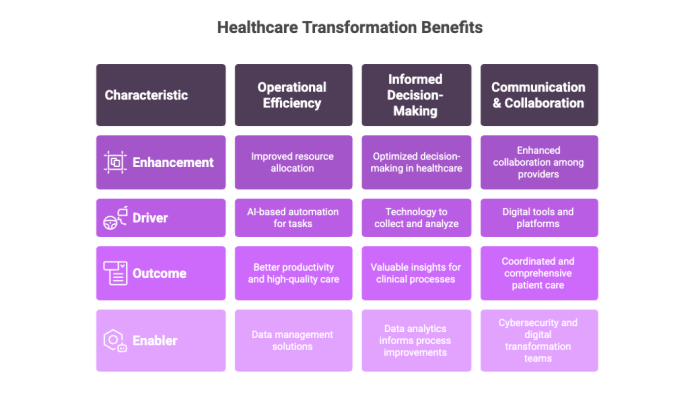

Case Studies of Successful Digital Transformation
Real-world examples of successful digital transformation initiatives provide valuable insights and lessons for healthcare organizations. By examining case studies from leading institutions, healthcare providers can learn important lessons and apply them to their own digital transformation efforts.
This section will explore how Atrium Health and University of Wisconsin Health have successfully implemented digital strategies to enhance patient outcomes.
Atrium Health's Virtual Health Integration
The pandemic prompted Atrium Health to accelerate its digital transformation efforts, focusing on virtual health services. Layering predictive analytics and AI at patient touchpoints and using chatbots enhances patient and caregiver experiences at Atrium Health.
One of Atrium Health’s priorities following the pandemic is to maintain momentum towards virtual health and improve patient and caregiver experiences. These efforts have led to significant improvements in accessibility, patient engagement, and overall healthcare quality.
Atrium Health’s integration of virtual health services demonstrates the potential of digital transformation to revolutionize healthcare delivery. Leveraging advanced technologies has enabled them to create a more efficient and patient-centered healthcare system.
University of Wisconsin Health's Digital Strategy
University of Wisconsin Health (UWH) focuses on integrating digital initiatives into the organizational strategy, ensuring that digital transformation efforts align with the overall goals of the organization. This strategic integration spans all levels of the organization, from leadership to frontline staff, fostering a cohesive approach to digital transformation.
Cherodeep Goswami, the system vice president and chief information officer at UWH, plays a crucial role in driving these digital initiatives. His leadership ensures that the organization remains at the forefront of digital innovation in healthcare.
UWH’s business strategy emphasizes the importance of a unified approach to digital transformation, integrating advanced technologies and fostering a culture of continuous improvement. This strategy has resulted in significant improvements in patient care, operational efficiency, and overall healthcare quality.
Examining the successes of Atrium Health and UWH provides healthcare organizations with valuable insights into best practices for digital transformation. These case studies highlight the importance of strategic planning, leadership, and the integration of advanced technologies in achieving successful healthcare transformation.
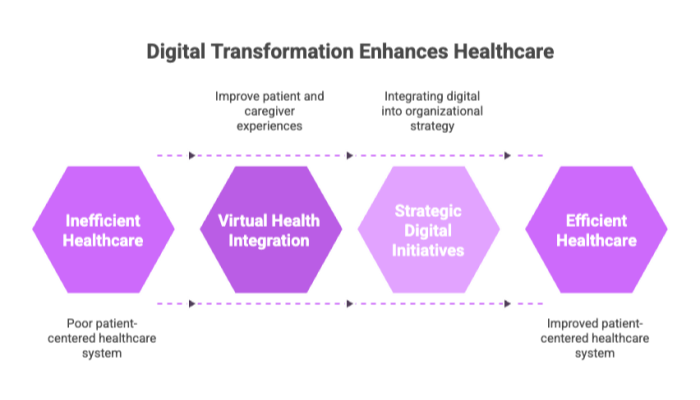

Future Trends in Healthcare Transformation
Looking to the future, several trends and innovations will continue to drive healthcare transformation:
-
Advances in telehealth
-
Remote monitoring
-
Emerging technologies like AI and EHR systems These will play a critical role in shaping the future of healthcare.
This section will explore the expected growth and impact of these innovations on patient expectations, consumer expectations, patient care, and healthcare delivery in the healthcare sector.
Advances in Telehealth and Remote Monitoring
Telehealth is poised for continued growth, offering innovative solutions that enhance patient outcomes. The integration of telehealth technologies is expected to transform healthcare delivery, making it more efficient and accessible for patients in rural and underserved areas.
Advancements in remote monitoring devices enable patients to manage chronic conditions more effectively from their homes, reducing the need for frequent hospital visits and improving overall health outcomes. The future of healthcare relies on the successful integration of telehealth and remote monitoring as essential components of patient care.
These communication technologies offer significant benefits for patients and healthcare providers, improving access to care, enhancing patient engagement, and reducing healthcare costs. As telehealth and remote monitoring continue to evolve, they will play an increasingly important role in healthcare transformation.
Emerging Technologies and Innovations
Emerging technologies and innovations are crucial in transforming healthcare systems to improve patient outcomes. Innovations like electronic health records (EHR) enhance the quality of patient care and streamline data management, making healthcare more efficient and effective.
Artificial intelligence is revolutionizing diagnostics and treatment plans, optimizing operational efficiency and enabling personalized care. As technology integrates further into healthcare, the potential for enhanced patient outcomes and satisfaction increases substantially.
The future of healthcare is set to evolve with advancements in telehealth, remote monitoring, and other innovative digital tools. These technologies will continue to drive healthcare transformation, making it more patient-centered, efficient, and accessible.
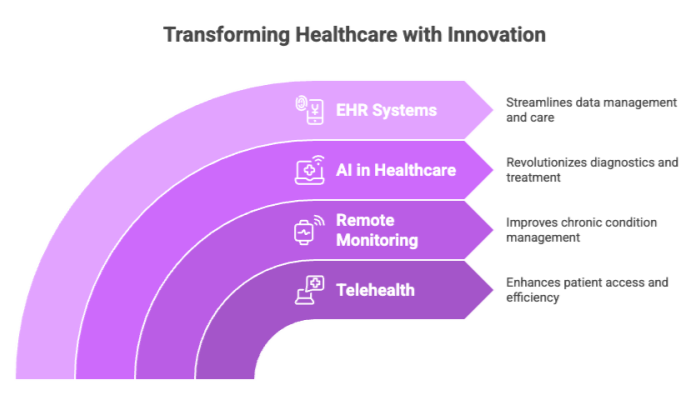

Summary
In summary, the transformation of healthcare through digital technologies offers significant benefits for patient care, operational efficiency, and overall healthcare quality. By adopting a patient-centric approach, integrating advanced technologies, and addressing challenges such as data security and financial pressures, healthcare organizations can successfully navigate the digital transformation journey.
Real-world case studies from Atrium Health and University of Wisconsin Health demonstrate the potential of digital transformation to revolutionize healthcare delivery. These examples highlight the importance of strategic planning, leadership, and collaboration in achieving successful outcomes.
As we look to the future, advances in telehealth, remote monitoring, and emerging technologies will continue to shape the healthcare landscape. By embracing these innovations, healthcare organizations can improve patient outcomes, enhance operational efficiency, and create a more patient-centered healthcare system.

Frequently Asked Questions
This FAQ section addresses common queries related to the transformation of healthcare, highlighting the role of digital health solutions and the importance of health insurance portability in modern health care organizations. It explores how the health care industry is evolving through digital investments and improved healthcare infrastructure, focusing on achieving desired outcomes such as enhanced patient outcomes and optimized population health.
These insights reflect the ongoing digital transformation process within health systems and healthcare companies, emphasizing the integration of advanced technologies and strategic approaches to revolutionize health care delivery.
What is the essence of healthcare transformation?
The essence of healthcare transformation lies in adopting a patient-centric approach, which prioritizes individual needs and preferences while integrating advanced technologies and fostering collaboration among stakeholders to enhance patient outcomes and overall healthcare quality.
How do electronic health records (EHR) systems benefit healthcare?
Electronic health records (EHR) systems significantly enhance healthcare by improving data availability and efficiency, which supports personalized treatment plans. This digital management ultimately leads to better patient outcomes and streamlined workflows.
What are the challenges of digital transformation in healthcare?
Digital transformation in healthcare faces significant challenges such as resistance to change, data security and privacy concerns, and financial pressures. Addressing these obstacles requires effective leadership, strong cybersecurity measures, and strategic resource allocation.
How does telemedicine improve patient care?
Telemedicine significantly enhances patient care by increasing access to healthcare services for underserved populations and overcoming geographic barriers. This approach results in improved management of chronic conditions and better overall health outcomes.
What are the future trends in healthcare transformation?
The future of healthcare transformation will prominently feature advancements in telehealth and remote monitoring, alongside the integration of AI in diagnostics and treatment. These developments are poised to significantly enhance patient care and operational efficiency.

